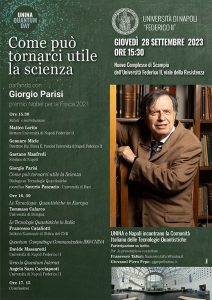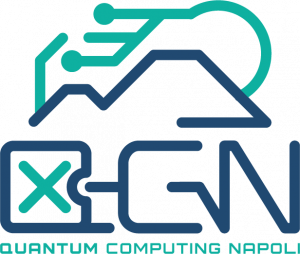News & events
Quantum Open Day with the Superconducting Quantum Computer
A great opportunity to see Partenope up close, the first Italian quantum computer with a 25-qubit superconductive platform!
The 25-qubit quantum computer with a superconductive platform is unique in Italy and among the few in Europe. Inaugurated in May 2024 with PNRR funding from the National Research Center in HPC, Big Data and Quantum Computation and named “Partenope”, it is undergoing further enhancement in its components. At full operation (early spring 2025), the processor will have a computing power based on at least 40 qubits, constituting a reference for cutting-edge research in the sector and a quantum computing and education tool for cutting-edge institutions and industries. The open day is an opportunity to discuss the progress and horizons of quantum computing, to observe in detail and in person the architecture of a quantum machine, unique in the national panorama, to meet young researchers who work in the quantum technologies sector and to get the latest news on cutting-edge projects on quantum computing, such as the European Pathfinder FERROMON project.
The visits will be organized in groups of 15 to 20 people and will last approximately 30 minutes. It is necessary to book and the time for each booking will be communicated later. To book, send an email to the following three addresses by December 31, 2024: francesco.tafuri@unina.it, davide.massarotti@unina.it, halimagiovanna.ahmad@unina.it, with the subject “Quantum Open Day”, indicating the organization you belong to, the number of people interested and any preferences regarding the visiting time.
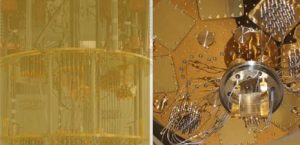
Website
Start date
Jan 9th-10th 2025 3:30 pm, Department of Physics “Ettore Pancini”, 10 am to 5 pm.
Where
Napoli
Università degli Studi di Napoli “Federico II”, Campus Monte Sant’Angelo
MIMIT Deputy Minister Visits Federician Quantum Computing Laboratories

Website
Event date
June 28th, 2024
Call for the XL Cycle PhD in Quantum Technologies
http://www.unina.it/didattica/
The announcement is currently only in Italian, but the English version will also be published on the following site shortly at this link:
http://www.unina.it/didattica/
9 paid positions have been granted (4 from the University of Naples Federico II).
Applications can only be submitted via web.
Start date
June 10th, 2024 at 10.00 am
End date
July 1st, 2024 at 12.00 am
Inauguration of Unina Superconducting quantum computing Center 24 qubits and more
The superconducting quantum computing center will be inaugurated on May 29, 2024 at Federico II. The project, funded under the Spoke 10 “Quantum Computing” of ICSC – National Research Center in High Performance Computing, represents an enhancement and expansion of the original quantum technologies laboratory of the University of Federico II. The new center hosts a 24-qubit superconducting quantum computer designed to be scalable, modular and modifiable, with the aim of supporting the activities and needs of Research and Industry and promoting the development of an Italian quantum computing supply chain through the training of new skills and professionalism. The laboratory, which adopts support systems with alternative quantum processors developed by the Federico II University of Naples in collaboration with research centers and industries, also aims to expand its activity shortly, with the installation of a 40-qubit quantum processor by the end of 2024.
The event will feature the main exponents of the realities belonging to the world of research and businesses today engaged in the development of quantum computing, increasingly at the center of European and international strategic policies. Also on the program are speeches by the Rector of Matteo Lorito, the Mayor of Naples Gaetano Manfredi, the Councilor for Research, Innovation and Startups of the Campania Region Valeria Fascione, and the Head of the ‘Quantum Computing’ Sector of the European Commission Oscar Diez. Space will be given to the presentation of Italian and European projects dedicated to quantum computing, including those funded by the PNRR and promoted by the National Center ICSC and by the Extended Partnership and by the National Quantum Science and Technology Institute (NQSTI). Guided tours of the new laboratory will also be scheduled on both days.

Event dates
May 29th 2024 10 am Sala Azzurra, Centri Comuni
May 30th 2024 9:30 am Aula Caianiello, Dipartimento Fisica E.pacini
Where
Napoli
Complesso di Monte Sant'Angelo
Ferromon press release

LEAD: Unina
CONSORTIUM PARTNERS: Quantware, Center for Quantum Devices, Niels Bohr Institute (NBI), Qblox, QuantrolOx
Grant agreement ID: 101115548
The FERROMON project has been selected and supported by the EU as one of the Pathfinder projects in the field of quantum computation. With its Pathfinder programme, the EIC supports the exploration of bold ideas for radically new technologies. With this spirit, the FERROMON Consortium, composed of the University of Napoli, the Niels Bohr Institute in Copenhagen, and the three leading companies Quantware, Qblox, and QuantrolOx, brings together quantum technologists and researchers with the following questions:
- Can we design novel superconducting qubits with more attractive scalability profiles?
- And can we accelerate their development with automated bring-up characterization and testing using the best of today’s industrial-grade quantum technology?
FERROMON will provide European scientific and industrial communities with a novel building block to develop quantum computers based on a new kind of superconducting qubit. In FERROMON project we will use both tunnel ferromagnetic Josephson junctions and semiconducting nanowire junctions to replace the traditional Josephson Junctions to form transmon-based quantum processors with enhanced functionalities in terms of control and scalability. We expect this to contribute to solve at least four of the most prominent problems in current state-of-the-art implementations of superconducting circuits:
(1) Connectivity and related heat load,
(2) Low two-qubit gate fidelity,
(3) Drifting calibration parameters and
(4) Instability in qubit frequency.
FERROMON based systems have a significantly improved scalability potential compared to the current state-of-the-art solutions thanks to reduction of needed control lines, which will entice major players in the deep tech sector to fund additional research and development. FERROMON will create a significant, long-lasting effect on quantum technologies in both Europe and worldwide by revolutionizing how superconducting based quantum computers are built.
Moreover, FERROMON based quantum computers will require less resources and consume less energy with respect to current superconducting based quantum computing platforms which aligns perfectly with goals of the European sustainable development and green deal. Future FERROMON based quantum computing platforms will provide easier modularity (less cabling) and higher energy efficiency (less current density) which will work together to reduce costs and boost profits..
Website
Quantum Day con Giorgio Parisi, Premio Nobel per la Fisica 2021
Nobel Prize winner Giorgio Parisi will celebrate the national day dedicated to Quantum Technologies at Federico II. Professor Parisi, Nobel Prize winner for Physics 2021, will hold the seminar “How Science can be useful to us”. It will be introduced by the Rector of Federico II Matteo Lorito, the Director of the Physics Department ‘Ettore Pancini’ of Federico II, Gennaro Miele, and the Mayor of Naples Gaetano Manfredi.
The seminar will be the starting point for further insights into Quantum Technologies in the European and national context and on the role and positioning of the Federico II research with the expert teachers Saverio Pascazio, Tommaso Calarco, Francesco Cataliotti and the moderators Francesco Tafuri and Giovanni Piero Pepe. The event will be closed by two presentations of QT activities at Federico II held by Davide Massarotti and the professor Angela Sara Cacciapuoti.
Event dates
Sep 28th 2023 3:30 pm, Aula Magna of the Federico II Campus in Scampia
Where
Napoli
Università degli Studi di Napoli “Federico II”, Scampia’s campus
The first algorithm on an Italian public quantum computer at University of Napoli “Federico II”
The public quantum computer is now a reality at the Federico II University and is open to the community. The first Italian public solid-state quantum computer was built in the laboratories of the Department of Physics ‘E. Pancini’ and in recent weeks the first hybrid classical/quantum algorithm was successfully executed. The computer currently uses a 5-bit quantum processor (qubit) in superconducting cooled in a dilution cryostat at temperatures close to absolute zero (10 milliKelvin). This first experiment is based on a grounded expertise at Federico II in superconducting quantum electronics and macroscopic quantum phenomena and was possible thanks to the collaboration with the Quantware industry that built the processor.
The group led by Professors Francesco Tafuri and Giovanni Piero Pepe designed and assembled the experimental set-up, integrated the quantum processor and developed the measurement protocols with fundamental contributions from researchers Davide Massarotti, Halima Giovanna Ahmad, Domenico Montemurro and PhD student Pasquale Mastrovito, among others. The algorithm, based on artificial intelligence methodologies, was designed and implemented by Professor Giovanni Acampora and researcher Autilia Vitiello, also thanks to the contribution of PhD students Roberto Schiattarella and Angela Chiatto, and minimizes the effect of “quantum noise”, making the calculation more reliable and usable in real operational contexts. The algorithm was successfully tested on the UNINA quantum computer, validating the preliminary results obtained on an IBM quantum simulator.
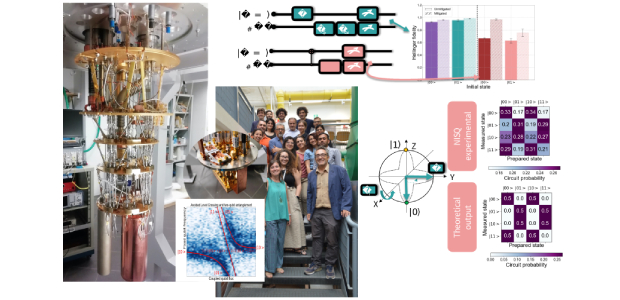
Website
Event dates
Juli 11th 2023
The Quantum Bit in the Time of COVID-19. Experiment at the Department of Physics
For the first time in Italy, the properties of a superconducting quantum bit (qubit) have been measured and manipulated using appropriate microwave signals. The experiment took place at the Department of Physics E. Pancini of the University of Naples Federico II, in collaboration with the SeeQc-Eu (Superconducting energy efficient Quantum Computing) industry. The result, the fruit of various experiments, prepared in recent months and carried out in part during the health emergency due to COVID-19, with measurements carried out remotely without violating the “Stay at home” order, is also a small contribution in these terrible days to look to the future with an eye of greater hope and mature awareness of the fact that knowledge and science are always in motion and always ready to offer lasting answers and solutions to the history and evolution of man.
The teams involved for Unina: Davide Massarotti, Halima Ahmad, Alessandro Miano, Luigi Di Palma, Roberta Caruso, Domenico Montemurro, Giovanni Piero Pepe, Francesco Tafuri SeeQc Team: Marco Arzeo, Katie Porsch, Caleb Jordan, Matt Hutchings, Oleg Mukhanov Chalmers Team: Andreas Bengtsson, Jonas Bylander
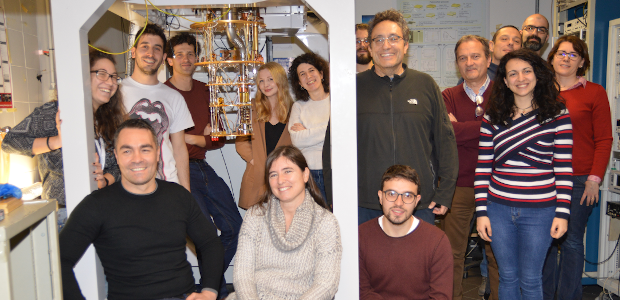
Website
Event dates
April 7th 2020
